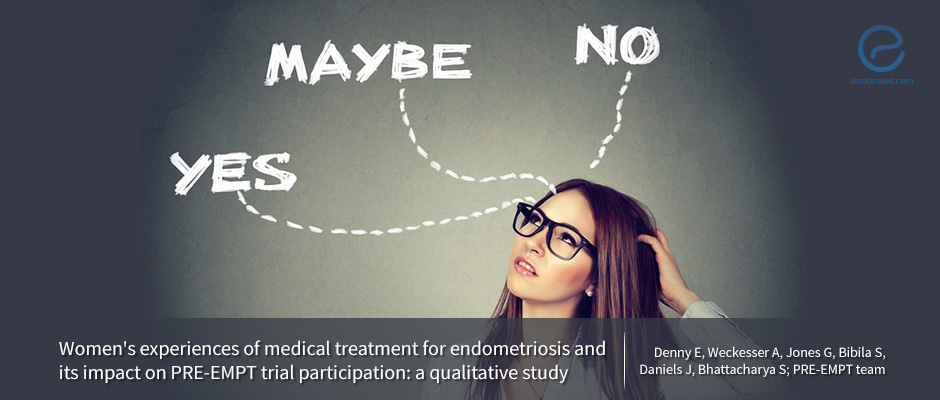Factors Affecting Women’s Choices to Enter Clinical Trials
Mar 20, 2019
Results are based on the findings of a study that analyzed women who participated in the PRE-EMPT clinical trial.
Key Points
Highlights:
- This study analyzed women participating in the PRE-EMPT clinical trial with the aim to assess the effectiveness of long-acting progestogens on the risk of endometriosis returning after surgery.
- Women’s willingness to take part and stay on a clinical trial is influenced by their past experience, present situation, and future expectations of medical treatments.
Importance:
- The findings of the study give clues to researchers on ways to optimize the number of participants willing to take part and stay in a clinical trial.
What's done here:
- Researchers interviewed 10 women taking part in the PRE-EMPT clinical trial.
- Focus-group discussions among four women who participated in the trial were also held.
- These elicited their past experiences with the treatments used in the trial and examined their willingness to accept each treatment after surgery.
Key results:
- Women’s willingness to enter the PRE-EMPT trial was linked to their previous experiences, present situation, and future expectations of medical treatments.
- Women’s willingness to enter the trial was also influenced by the control offered to them by flexible randomization, which allows the option to reject a particular treatment.
Limitations:
- Women who participated in the present study had agreed to participate in the PRE-EMPT trial. Those who declined to participate may have had different perspectives.
Lay Summary
Women were strongly influenced by their previous experiences and personal circumstances when deciding to take part in a clinical trial. This is based on the findings of a study published in the journal Pilot and Feasibility Studies that explored the effect of women’s past experiences with medical treatments for endometriosis and the impact this has on their motivation to enter a clinical trial called PRE-EMPT (preventing recurrence of endometriosis by means of long-acting progestogen therapy).
The findings of this study are important because the authors suggest that researchers may optimize the number of participants willing to take part in a clinical trial and stay on the trial until the end by including them in the early stages of trial design and allowing them to express their own decision-making processes.
The study adopted a qualitative methodology that involved semi-structured interviews of 10 women in three UK cities. It also used one focus group made up of four women with a diagnosis of endometriosis participating in the PRE-EMPT trial.
The results showed that women’s willingness to enter the PRE-EMPT trial was linked to their previous experiences, present situation, and future expectations of medical treatments. The control offered by flexible randomization, which allows the option to reject a particular treatment following surgery also had a big impact on women’s willingness to take part in the trial. The PRE-EMPT trial is ongoing at the University of Aberdeen and 35 other centers and is funded by the National Institute for Health Research in the UK. It is expected to run through to June 2021.
The aim of the trial is to compare the effectiveness of long-acting progestogens (either as three monthly injections or as a coil, which is inserted into the womb where is remains for five years), or long-term treatment with the oral contraceptive pill in women undergoing endometriosis surgery.
Women, ages 16 to 45 with no immediate plans to conceive and who are undergoing surgery for endometriosis are eligible to take part in the trial.
Previous studies suggested that medicines containing progestogens may reduce the risk of endometriosis recurring following surgery. However, these studies failed to provide definitive results.
Research Source: https://www.ncbi.nlm.nih.gov/pubmed/?term=30410786
clinical trial PRE-EMPT long-acting progestogens

